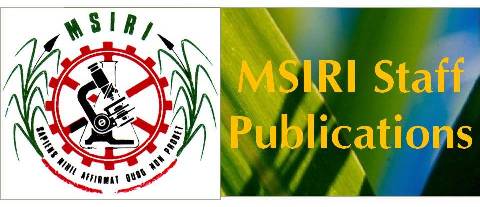SNP discovery in wheat
| MSI04P4100 | |
| Parmessur, Y. | |
| University of East Anglia, England | |
| SNP discovery in wheat | |
| Thesis, MSc Plant Breeding and Biotechnology | |
| Thesis | |
| 2004 | |
| 60 p.: 3 tbls, 14 figs, 8 appen. | |
| En | |
| En | |
| SNPs are single base positions on genomic DNA where an alternative allele exists due to base substitution, insertions or deletion. Although SNPs are mostly biallelic, their abundance and stability makes them the marker of choice for dense mapping, fingerprinting and diversity studies. Because of the nature of their variation, high throughput platforms have been developed for their genotyping, whereas most existing markers are still dependent on high cost/ low throughput detection platforms. SNP marker development is divided in two stages; an initial SNP discovery step followed by a validation step. The development of SNP markers in wheat (Triticum aestivum L.) has been hampered mainly by its large genome size and its existence as an allopolyploid with three genomes (A, B and D). This makes it an unsuitable species for the commonly used approaches to SNP discovery based on data mining or the sequencing of a fraction of the genome etc. In this project, an alternative approach will be tested: Locus Specific PCR Amplification and Sequencing of Wheat Introns for SNP discovery. Introns in wheat were positioned by aligning wheat ESTs against rice (Oryza sativa L.) genomic DNA sequence. Primers were designed from wheat sequences at exon/intron boundaries ensuring amplication of a single intron of 300-400bp represented as a single copy genes in rice. Twenty primer pairs were used to amplify introns from wheat variety Chinese Spring and amplicons were used to construct a library. This library was extensively sequenced (160). A second library was constructed from pooled amplicons of 20 old wheat varieties and inserts were also sequenced (700). Sequences from the two libraries were pooled and aligned using Polyphred. 110 contigs were produced, most of which contained one or more base mismatch. Sequence representation of Chinese Spring in the contigs enabled elimination of false SNP derived from two loci. Further sequence analysis by ClustalX showed the ability of Polyphred to align sequences into contigs, each likely to be genome specific. Contig specific primers were therefore designed and tested on wheat nulli-tetrasomic lines. Half of the newly designed primer pairs (5) produced amplicons mapped on a single chromosome suggesting that primers were genome specific. Only three primer pairs produced single copy amplicons when PCR products from the above five primer pairs were run on MDE gels. This suggest that contigs from which these three primers were derived are genome specific. Altogether seven SNPs were detected from the three contigs suggesting that on average one SNP was present on every 150 bp of wheat introns. No conformational polymorphism was detected on MDE gel. An allele specific assay was devised by designing forward primers with variation at the 3` end specific to each SNP variant. The base penultimate to the SNP was deliberately substituted to ensure differentiation between the two variants by a double 3` mismatch. The 20 varieties were screened with the allele specific forward primers and their corresponding genome specific reverse primers. In one case, three varieties (Fidel, Rapier and Orestis) failed to amplify, probably suggesting that they represent the alternative allele. This result was reproducible when the assay was repeated with the inclusion of a third primer universal to both SNP variants (3-primer assay). Positive amplification by the universal primer eliminates false negative errors. In this project, it has been possible to devise a method for SNP discovery in wheat and validate the SNP. The discovery of SNPs by Locus Specific Amplification has been successful mainly because it captures all the homoeoamplicons enabling the design of genome specific primers for SNP validation. Most previously tested approaches failed to validate SNPs because of incomplete representation of sequences from homoeoamplicons to enable design of genome specific primers which is the basis of most SNP genotyping assays in wheat. The use of Polyphred, a newly introduced software for sequence alignment at high stringency has also been a important tool in the success of this approach. | |
| Wheat Triticum aestivum DNA SNP SNP markers Genetic engineering SNP identification Identification method Locus specific amplification | |
| Cane breeding and genetics | |
| Genetic techniques and protocol | |
| 2004-11-26 | |
| En | |
| BIOTECH | |
| Biotech |
